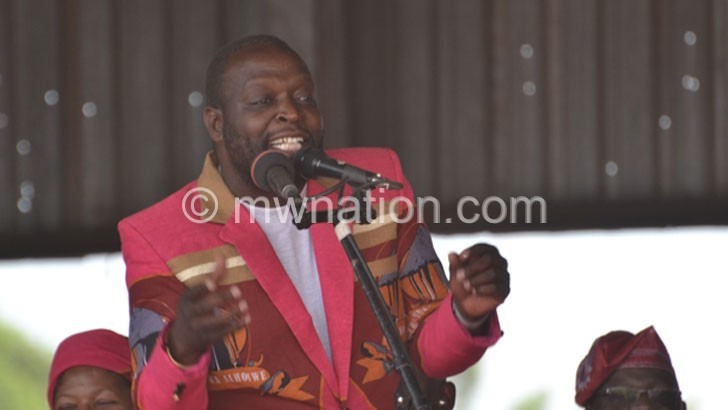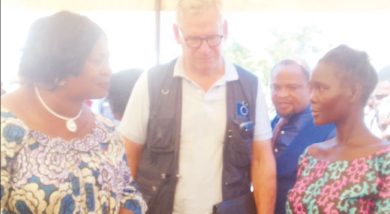Mulli’s Lhomwe, DPP link draws outrage
Months after disputing the link between Mulhako wa Alhomwe and governing DPP, the cultural grouping’s chairperson Leston Mulli has come under fire for tribalising the party and politicising the ethnic group.
Opposition political parties and some analysts yesterday said by suggesting during the Muhlako wa Alhomwe 11th anniversary celebrations at Chonde in Mulanje on Sunday that Lhomwes should only vote for the governing Democratic Progressive Party (DPP) and their tribal kin, President Peter Mutharika, the politically-connected businessperson could trigger political violence by fanning tribal conflicts ahead of the May 21 2019 Tripartite Elections.

In his address as chairperson of Mulhako wa Alhomwe board of trustees, Mulli said: “This is no political grouping, but I have one message for those going against APM: You are not winning any seat in the Lhomwe belt. What those rebels did has no place in our culture as Lhomwes.
“They cannot be castigating the President like they do at various podiums. We will ensure they lose their seats come May next year.”
He was apparently referring to Mulanje West legislator Patricia Kaliati, her Mulanje South counterpart Bon Kalindo and Blantyre City East member of Parliament (MP) Noel Masangwi who quit their DPP national governing council (NGC) positions to support-President Saulos Chilima as a presidential candidate for United Transformation Movement (UTM) ticket.
While Mulli linked Lhomwes to DPP on Sunday, the businessperson and Lhomwe Paramount Chief Ngolongoliwa are on record as having earlier clarified that Mulhako wa Alhomwe was not a political grouping and did not align itself to any political party.
Their reaction followed remarks by Kaliati, Masangwi and former DPP director of youth Lewis Ngalande that Mulli and Ngolongoliwa chaired a meeting at Sanjika Palace in Blantyre in April that asked the trio to denounce their support for Chilima then through what was called the ‘Chilima Movement’.
Reacting to Mulli’s Sunday utterances, Malawi Congress Party (MCP) spokesperson the Reverend Maurice Munthali described the remarks as unfortunate, divisive and undemocratic in the multiparty dispensation.
He said: “To associate the DPP with the Lhomwe belt [districts of Chiradzulu, Thyolo, Phalombe, Mulanje and parts of Zomba] is to show that they have no regard for other areas.
“For a long time, we have been talking about regionalism, tribalism and nepotism. Now we have been vindicated that the DPP practises these things because they have allowed Mulli to make these utterances in public.”
Munthali said Malawians will be affected when parties start claiming that certain areas belong to them alone.
People’s Party (PP) spokesperson Ackson Kalaile Banda also condemned Mulli for using a tribal card to advance partisan political interests.
He said: “This has the potential to fan political violence in the run up to next year’s elections as there will be no-go zones. Malawians should not allow such people to use tribes for political gains.”
But United Democratic Front (UDF) spokesperson Ken Ndanga, whose party is in a political bedfellow of DPP, said Mulli was only expressing his opinion.
“There is nothing we can do as a party,” he said before hanging up the phone.
In a separate interview, UTM spokesperson Joseph Chidanti Malunga expressed fear that Mulli’s remarks might influence ‘hooligans’ to throw stones at parties in the Lhomwe belt during campaign period on the claim that it is a DPP zone.
He said: “It is very sad that in the 21st century someone is still talking about tribes. For how long shall we continue to divide each other? What kind of a country are we going to have if we say the Lhomwe should support DPP, the Ngoni should support party ‘X’?”
From what is transpiring, commentators have described Mulhako wa Alhomwe as more political than just being a mere cultural entity intended to advance unity and tolerance.
“You can’t separate Mulhako from DPP, a political entity. We should remember that it was the late Bingu wa Mutharika who spearheaded its formation,” said a Chancellor College-based political analyst Ernest Thindwa.
He felt the grouping was formed as a strategy to secure the Lhomwe votes.
“It is viewed as a pool of votes for the DPP. Unfortunately, politics in Malawi is not a competition of ideas, but a competition of tribes and regions. Ethnic groups are used as vehicles to propel parties into power,” said Thindwa who shared sentiments that the utterances have the potential to fan violence.
Joining the condemnation is another commentator, Rafik Hajat, who said the remarks can fuel regionalism.
“In the past, we used to associate Alliance for Democracy [Aford] with the North, MCP with the Centre and UDF with the South. But now we should have moved from this kind of politics,” he said.
University of Livingstonia-based commentator George Phiri warned the DPP to discipline such people with sensitive remarks, saying they are alienating the party from other tribes.
He said: “Much as we understand Mulli is neither DPP nor Mulhako, his sentiments may imply DPP is for the Lhomwes only.”
On his part, DPP spokesperson Nicholas Dausi said Mulli was expressing his opinion.
Mulli, when asked whether Mulhako wa Alhomwe was a cultural or political grouping, yesterday declined to answer, saying the issues has been explained before.
He said: “But if you ask me on the repercussions of my sentiments during Mulhako celebrations, what I said there is what I said. Zinapita zimene zija ambuye, pano tiyeni tikambe za nandolo [What I said at Chonde is water under the bridge now. Let us talk about pigeon peas].”
Bingu founded Mulhako wa Alhomwe in 2007 as a cultural grouping for the Lhomwe people to preserve cultural identity and values.





